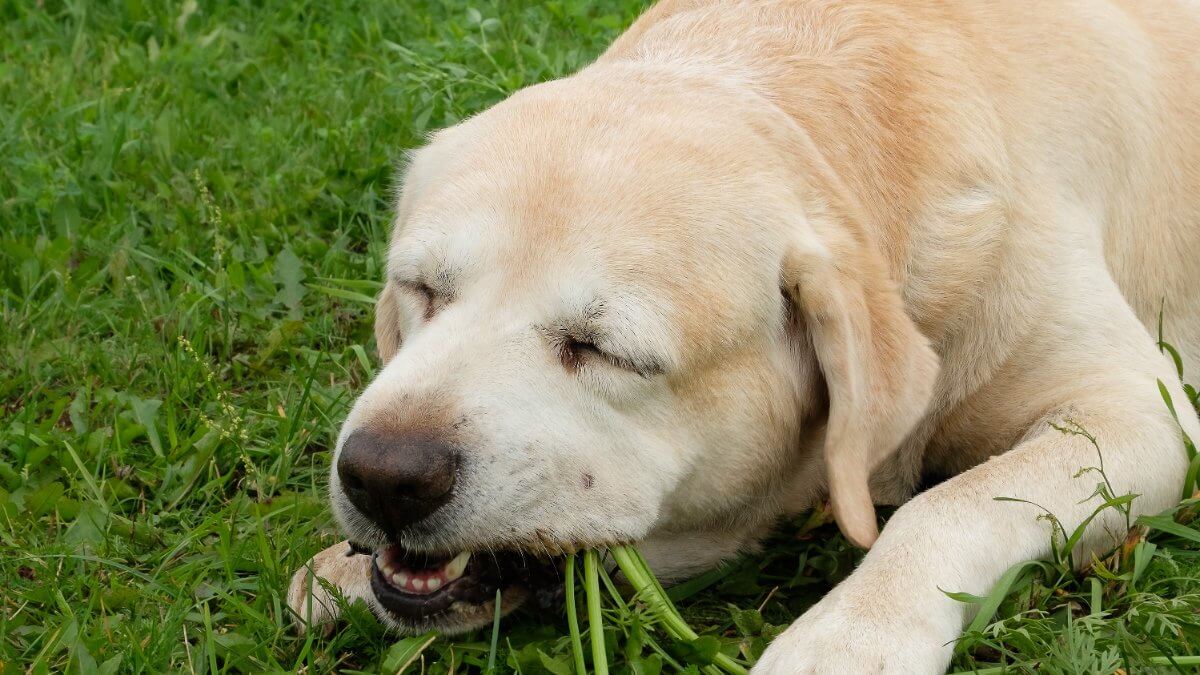
Home » Three Reasons Why Your Dog Is Eating Grass

Eating grass isn’t a typical, everyday dog behavior, so it’s easy to understand why you may be concerned as to why your beloved companion is suddenly munching on it like a cow in a pasture.
There are a variety of reasons why your dog may be choosing to eat grass, ranging from minor to serious. Despite how strange it may seem, grass-eating is actually a relatively common behavior in dogs, and there is typically no reason for concern as long as the dog is not vomiting.
One of the biggest debates surrounding dogs consuming grass is whether or not the dog is doing it because it feels sick. Multiple studies, however, suggest that dogs that eat grass do not feel particularly unwell before (or after) engaging in the behavior.
The good news is most experts tend to agree that eating grass is not harmful to dogs, though it is important to make sure the area in which the dog is grazing does not contain any toxins, herbicides or pesticides, all of which can cause serious health issues for dogs.
And remember, it is important to consult with a veterinarian if you are having trouble getting to the bottom of why your individual dog has picked up this—or any other—perplexing habit.
Here’s a look into three reasons why your dog may be eating grass:
Dogs sometimes eat grass in an effort to fulfill a need that isn’t being met by the diet they’re fed. Dogs require something that’s commonly called “roughage,” which is a plant-based feedstuff that is high in slowly degradable fiber. This fiber is essential for a dog’s gastrointestinal system to function efficiently, playing a role in gut health, digestion, weight management, and colon health.
If your dog is eating grass on a regular basis, it may be time to recheck the food label on their kibble bag and incorporate a higher level of fiber and/or switch foods entirely. Good sources of fiber for dogs include broccoli, carrots, kale, pumpkin, kelp, and milled flaxseed.
Your pup may be engaging in the activity of eating grass to soothe its personal jitters, using it as a coping mechanism. Dogs that suffer from anxiety typically engage in at least one problematic behavior, which can include eating grass, sometimes in conjunction with other behaviors.
Watch for signs of anxiety in your dog that can include excessive whining, panting, chewing (especially, in severe cases, chewing at its own body), licking the lips, drooling, and destroying objects. Some dogs specifically eat grass out of want for more attention, which can co-exist with separation anxiety.
Yes, there’s a chance your dog may be eating grass due to, well, little or no reason at all. If you suspect your dog is choosing to graze because it feels it has nothing better to do, it’s best to rethink your current exercise plan with Fido and assess how much mental stimulation your dog is truly getting throughout the day. Especially with breeds like the Border Collie, Belgian Malinois, and any other high-energy dog that requires a high level of exercise and a strong desire to take on a job, it’s important to stay on top of a daily exercise routine and provide training sessions that stimulate the mind as well as the body.
If boredom is playing a role in—or is the core reason—why your dog is eating grass, consider extending exercise/walk times, incorporating dog sports, frisbee, or fetch, and providing additional training sessions to your dog’s weekly schedule.
